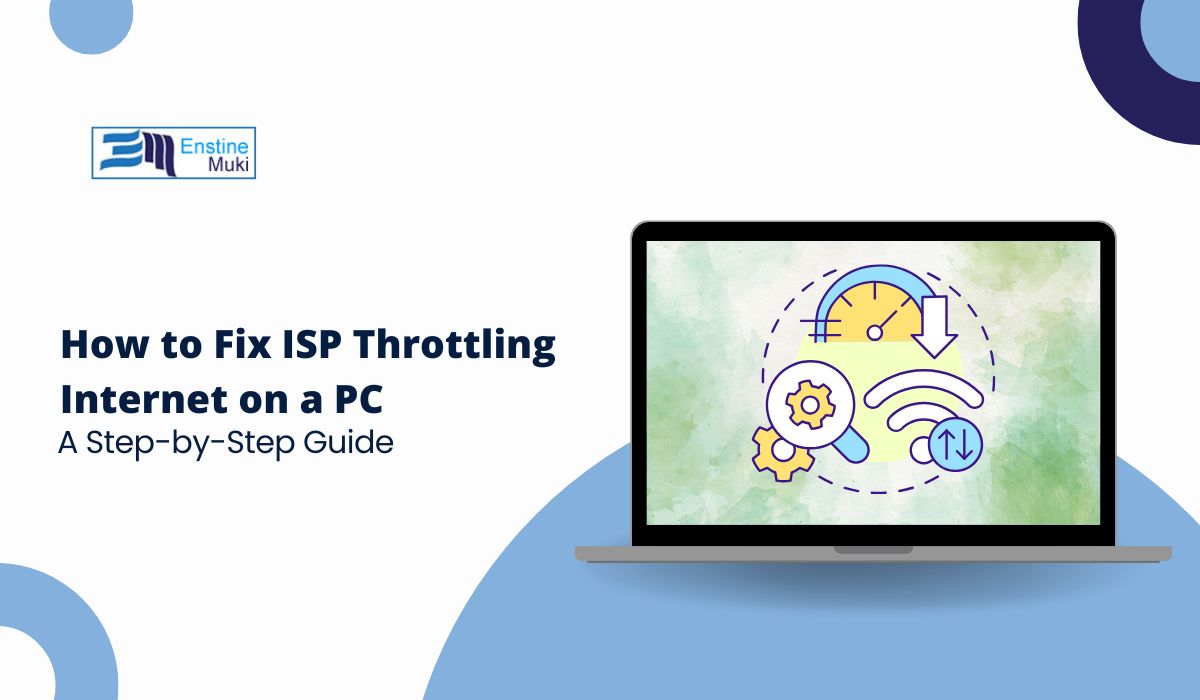Internet throttling by your Internet Service Provider (ISP) can be frustrating, especially when it slows down your connection at critical moments. ISPs throttle internet speeds for various reasons, from data cap policies to network prioritization. The good news is that there are ways to detect and fix ISP throttling on your PC. This article explores how to identify throttling and practical steps to address it.
What Is ISP Throttling?
ISP throttling occurs when your provider intentionally slows down your internet connection. This practice is often triggered by high bandwidth usage, network congestion, or specific activities like streaming or gaming. Throttling can result in slower download speeds, buffering during video playback, and reduced performance during peak usage times.
How to Detect ISP Throttling
Before fixing throttling, you need to confirm that it’s happening. Follow these steps to detect throttling:
- Run a Speed Test
Use tools like Ookla’s Speedtest or Fast.com to measure your internet speed. Run tests at different times of the day to spot inconsistencies. - Compare Normal and VPN Speeds
Connect to a VPN and run another speed test. If your speed improves while using a VPN, your ISP is likely throttling your connection. - Monitor Streaming and Download Speeds
Test specific services like YouTube, Netflix, or gaming downloads. Throttling often targets high-bandwidth activities. - Use Internet Monitoring Tools
Applications like GlassWire can help you monitor bandwidth usage and detect patterns of throttling.
Reasons for ISP Throttling
Here are the most common reasons why ISPs throttle internet speeds and how they might affect your connection:
- Exceeding Data Caps: Some ISPs impose data limits on plans. Once you exceed these caps, they throttle your speed until the next billing cycle.
- Traffic Prioritization: ISPs may prioritize certain types of traffic, such as video streaming or gaming, while limiting others. This can lead to slower speeds for non-prioritized activities.
- Network Congestion: During peak usage times, ISPs may throttle connections to reduce congestion and ensure fair usage for all users.
Fixing ISP Throttling on a PC
If you suspect your ISP is throttling your connection, try these steps to bypass it:
1. Use a VPN
A Virtual Private Network (VPN) encrypts your internet traffic, preventing your ISP from identifying the type of data you’re using. This makes it harder for them to throttle specific activities like streaming or downloading. Popular VPNs include:
- NordVPN
- ExpressVPN
- Surfshark
2. Change DNS Settings
Switching to a faster DNS server can improve speed and bypass some throttling techniques. Here’s how:
- Open Network Settings on your PC.
- Change the DNS to a public option like Google DNS (8.8.8.8) or Cloudflare DNS (1.1.1.1).
- Save changes and restart your connection.
3. Monitor and Limit Data Usage
Use tools to track your bandwidth usage and avoid exceeding data caps. If possible, opt for an unlimited data plan from your ISP.
4. Contact Your ISP
Sometimes, addressing throttling directly with your ISP can yield results. Inquire about higher-tier plans or express your dissatisfaction with throttling practices.
5. Optimize Your Network
- Ensure your router firmware is up to date.
- Use a wired connection for stable speeds.
- Limit the number of devices using your network simultaneously.
Tools and Software for Throttling Prevention
- VPNs: Encrypt traffic to hide activity from ISPs.
- Bandwidth Monitoring Tools: Apps like GlassWire help you manage and monitor data usage effectively.
- Router Settings: Access your router’s Quality of Service (QoS) settings to prioritize critical devices or applications.
FAQs About ISP Throttling
1. Is it legal for ISPs to throttle internet speeds?
Yes, in many regions, ISPs are legally allowed to throttle speeds. However, this depends on local net neutrality laws.
2. Can ISP throttling be permanent?
Throttling can last until the end of a billing cycle or until network congestion reduces. Persistent throttling might indicate a data cap issue.
3. Do all VPNs prevent throttling effectively?
Not all VPNs are equally effective. Opt for premium VPNs with high-speed servers to bypass throttling efficiently.
4. Will upgrading my plan stop throttling?
Upgrading to a plan with higher bandwidth or unlimited data can reduce throttling, but it’s not guaranteed.
Conclusion
ISP throttling can disrupt your online activities, but with the right tools and strategies, you can regain control of your internet connection. By using a VPN, adjusting DNS settings, and monitoring your data usage, you can minimize the impact of throttling. If the issue persists, consider negotiating with your ISP or exploring alternative providers for better service.
Have you experienced throttling on your PC? Share your experiences or tips for resolving it in the comments below!

